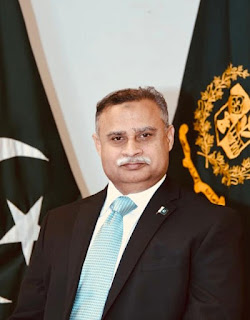Sex education to primary and secondary students will spoil society - Parents
British government legislates to teach Sex
Education from September 2020
The parents of the children in Pakistan
schools affiliated with western countries have expressed their grave concern
over the sex education and curricula being provided without their consent and any
approval from government authorities and the parliament.
In this regard they referred the British
government’s legislation that from September 2020 it will teach Sex Education
in primary schools and Relationship & Sex Education (RSE) in secondary
schools. The new legislation would require all students of 4 to 16 years age to
attend these classes. Their schools do not have to wait for September 2020
however, to start teaching RSE and many have already come to do so. RSE would
cover a range of issues, however many parents in UK were also concerned for exposing
children to sexualize concept and graphics.
It may be mentioned here that up until
September 2020 parents have rights to withdraw their child from all aspects of
RSE. From September 2020 onward the parents would have no right to withdraw
their child. It is said that RE refers to
Relationship Education and will become a mandatory part of the school
curriculum in all primary schools across the country.
There are widespread
concerns that the mandatory introduction of RE/RSE into all schools across England
from September 2020 would spread in Pakistan too. Comprehensive Sexuality
Education (CSE) is a sexual rights based initiative that aims to implement its
teachings into all schools there. The legislation is currently vague about what
will be taught in ‘Relationship Education’ in primary schools. Whilst the government has not yet published
its finalised guidelines for teaching RE/RSE, the parents are concerned about
the inclusion of certain aspects that may find their way into the new
curriculum.
The parents are
afraid that RE/RSE will be used to introduce controversial
and unscientific theories such as gender ideology that will teach children that
gender is fluid and differs from biological sex. Schools should not be made to
teach such ideas, especially as they lack any empirical basis and are based
solely on a subjective feeling. If such concepts are taught then young children
especially will become confused about gender identity as well as about the
differences between boys and girls.
That RE/RSE will be used to teach
concepts such as same-sex relationships being equal to heterosexual
relationships. Such teachings promote a lifestyle at odds with all major
religions and will conflict with the views of many parents. Whilst concur on
the need to protect children from sexual abuse, the parents are concerned that
talking directly to young children about sexual abuse will affect their
innocence and that it may lead children to worry that such an act will occur to
them.
There have been protests by parents in
England as they feel classes about LGBT rights
were age-inappropriate and incompatible with Islam. Under the
new curriculum, schools would be legally obliged to teach RSE, but the guidance
on which areas schools should focus on would be advisory. LGBT, or GLBT, is an initialism that stands for lesbian, gay,
bisexual, and transgender. In use since the 1990s, the term is an adaptation of
the initialism LGB, which was used to replace the term gay in reference to the LGBT community beginning in the mid-to-late 1980s.
Sex education has been compulsory in
England since 2017, but there has been a public consultation about what should
be on the curriculum. All pupils will now learn about menstrual health and the
menstrual cycle starting in primary school. Pupils will also learn about
relationships, starting in primary school, and relationships and sex, starting
in secondary school. The curriculum will also be LGBT inclusive.
Children in primary schools will have
relationships education and this will be broadened to relationships and sex
education in secondary schools. Health education for all ages will also be part
of the curriculum in England. Parents will still have the right to withdraw
their child up to age 15. However, head teachers are expected to talk to
parents who wish to exclude their child from these lessons, "discussing
with the parents the benefits of receiving this important education and any
detrimental effects that withdrawal might have on the child".
The guidance says that pupils need to
understand "that some people are LGBT [lesbian, gay, bisexual and
transgender], that this should be respected in British society, and that the
law affords them and their relationships recognition and protections". Secondary-age
pupils will also be taught about female genital mutilation (FGM) - focusing on
awareness, the availability of support networks and reminding them that it is
illegal.
There are certainly groups who have
concerns about what issues are covered in RSE and who feel some topics should
not be taught by schools. The Parent Power advice website says parents should
be able to educate children in line with their own religious faith. Recently, a
group of Muslim parents in Birmingham protested over
their children being taught about LGBT rights and homophobia. Also, a petition calling for parents to have
the right to opt their child out of sex education lessons has attracted
more than 106,000 signatures.
It says: “We believe it is the parent's
fundamental right to teach their child RSE topics or to at least decide who
teaches them and when and how they are taught”. We want the right to opt our
children out of RSE when it becomes mandatory in Sept 2020. We have grave
concerns about the physical, psychological and spiritual implications of
teaching children about certain sexual and relational concepts proposed in RSE
and believe that they have no place within a mandatory school curriculum, they
added.
By Nasir Mahmood




Comments
Post a Comment